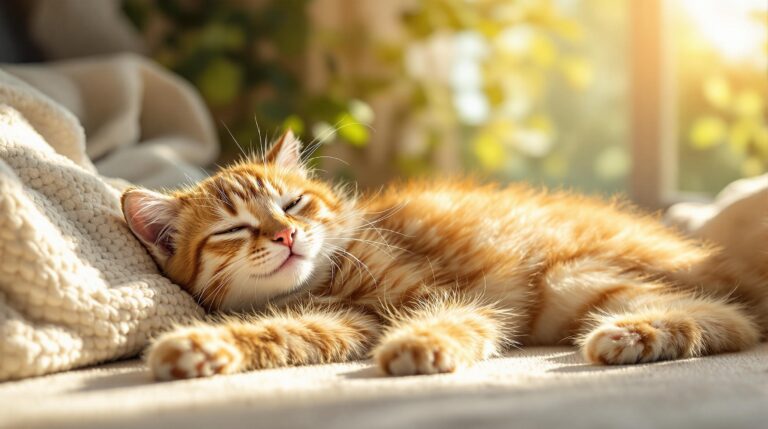Cats losing hair can be a concerning issue for pet owners. This article delves into the common causes of cat hair loss, such as allergies, parasites, and thyroid disorders, and provides practical tips for managing and preventing this condition. By understanding the symptoms and treatment options, we can ensure your feline friend stays healthy and happy. Discover how to identify the signs of hair loss, explore natural remedies, and learn about the importance of a balanced diet and regular grooming.
Common Causes of Cat Hair Loss
Allergies and Their Impact
Allergies are a common cause of cats losing hair. These can be triggered by a variety of factors, including food, environmental allergens, and flea bites. When a cat is allergic to something, their immune system overreacts, leading to symptoms such as itchy skin, redness, and hair loss. Common culprits include pollen, dust mites, and certain foods like beef, chicken, and dairy products.
Identifying allergies in cats can be challenging, but a vet can perform tests to determine the specific allergens affecting your cat. Treatment options include antihistamines, corticosteroids, and hypoallergenic diets. Regular vet check-ups are essential to monitor your cat’s health and manage their allergy symptoms effectively. If you need more information or have any questions, feel free to contact us or call us at (800) 343-1604.
Parasites and Hair Loss
Parasites such as fleas, ticks, and mites can also cause cats to lose hair. These tiny pests can cause intense itching and irritation, leading to hair loss and skin problems. Fleas, in particular, are a common issue and can cause flea allergy dermatitis, a condition where a cat becomes allergic to flea saliva.
Treating parasites involves using flea treatments, deworming medications, and topical solutions. Regular grooming and maintaining a clean environment are also crucial in preventing parasite infestations. Flea collars, sprays, and shampoos can help keep your cat free from these pesky bugs. For more tips on parasite prevention, visit our website or follow us on Facebook.
Thyroid Disorders and Hair Loss
Thyroid disorders, such as hyperthyroidism and hypothyroidism, can also contribute to cats losing hair. Hyperthyroidism occurs when the thyroid gland produces too much thyroid hormone, leading to symptoms like weight loss, hyperactivity, and hair loss. Hypothyroidism, on the other hand, is less common and occurs when the thyroid gland is underactive, resulting in weight gain and hair loss.
Treatment options for thyroid disorders include medications, surgery, and radioactive iodine therapy. Regular vet check-ups and thyroid function tests can help monitor your cat’s thyroid health and ensure they receive the appropriate treatment. Early detection and intervention are crucial for managing these conditions effectively. If you have any concerns about your cat’s thyroid health, don’t hesitate to reach out to us at info@catkarmacreations.com.
Stress and Environmental Factors
Stress and environmental factors can also play a significant role in cats losing hair. Changes in the environment, routine, and anxiety can all contribute to excessive grooming and hair loss. Cats are creatures of habit and may become stressed by even minor changes, such as moving to a new home or the introduction of a new pet.
Managing stress in cats involves creating a consistent routine, providing a safe and comfortable living space, and engaging in stress-reducing activities. Behavioral therapy, calming aids, and environmental adjustments can help reduce stress and prevent hair loss. Ensuring your cat has a quiet, comfortable place to retreat to can also be beneficial. For more stress-reducing tips, check out our nature-inspired products that can help create a calming environment for your cat.
Symptoms of Cat Hair Loss
Identifying Patchy Hair Loss
Patchy hair loss is a common symptom of cat hair loss and can indicate various underlying issues. These patches may appear suddenly or gradually and can be localized to specific areas of the body. Patchy hair loss is often a sign of an underlying health problem and should be addressed promptly.
Common causes of patchy hair loss include allergies, parasites, and skin infections. If you notice any patches of hair loss on your cat, it is essential to consult a vet for a proper diagnosis. Early intervention can help prevent the condition from worsening and ensure your cat receives the appropriate treatment. For more information on identifying and treating patchy hair loss, visit our cat-themed jewelry page for some unique and stylish gifts that can help you celebrate your bond with your furry friend.
Recognizing Skin Irritation
Skin irritation is another common symptom of cat hair loss. Cats with skin irritation may exhibit signs such as redness, inflammation, and itching. These symptoms can be caused by a variety of factors, including allergies, parasites, and skin infections. Skin irritation can lead to excessive grooming and hair loss, making it important to address the underlying cause.
Your vet can perform skin tests and examinations to determine the cause of your cat’s skin irritation. Treatment options may include topical medications, antifungal creams, and oral medications. Regular grooming and maintaining a clean living environment can also help prevent skin irritation and promote healthy skin. If you have any questions or need more information, feel free to contact us or call us at (800) 343-1604.
Noticing Excessive Shedding
Excessive shedding is a common issue in cats and can be a sign of underlying health problems. While some shedding is normal, excessive shedding can indicate issues such as poor nutrition, stress, and skin problems. Cats with excessive shedding may have a dull, dry coat and may shed more hair than usual.
Managing excessive shedding involves addressing the underlying cause. A balanced diet rich in essential nutrients, regular grooming, and stress-reducing activities can help reduce shedding and promote a healthy coat. If you notice excessive shedding in your cat, consult your vet for a proper diagnosis and treatment plan. For more tips on managing excessive shedding, visit our sterling silver jewelry page for some beautiful and unique pieces that can help you celebrate your love for cats.
Treatment Options for Cat Hair Loss
Medical Treatments and Medications
Medical treatments and medications are often necessary to address the underlying causes of cats losing hair. These treatments can include antihistamines, corticosteroids, and hypoallergenic diets for allergies, flea treatments and deworming medications for parasites, and thyroid medications for thyroid disorders.
Your vet can recommend the most appropriate treatment based on your cat’s specific needs. Regular follow-up appointments and monitoring are essential to ensure the treatment is effective and to make any necessary adjustments. Medications should always be administered under the guidance of a vet to avoid potential side effects. If you have any questions or need more information, feel free to email us or call us at (800) 343-1604.
Natural Remedies and Supplements
Natural remedies and supplements can also be beneficial in managing and preventing cats losing hair. Omega-3 fatty acids, biotin, and other vitamins and minerals can help promote healthy skin and a shiny coat. These supplements can be added to your cat’s diet to support their overall health and well-being.
Herbal remedies such as chamomile and aloe vera can also be used to soothe irritated skin and reduce inflammation. Coconut oil and fish oil are excellent sources of omega-3 fatty acids and can be added to your cat’s diet to promote healthy hair and skin. Always consult your vet before introducing any new supplements to your cat’s diet to ensure they are safe and appropriate. For more natural remedies and supplements, visit our website or follow us on Instagram.
Diet and Nutrition for Healthy Hair
A balanced diet is crucial for maintaining healthy hair and skin in cats. Essential nutrients such as protein, vitamins, and minerals play a vital role in supporting your cat’s overall health. High-quality, nutrient-rich foods can help prevent cats losing hair and promote a shiny, healthy coat.
Key nutrients for healthy hair include protein, omega-3 fatty acids, biotin, and vitamins A, C, and E. These nutrients can be found in a variety of cat foods and supplements. Feeding your cat a diet rich in these nutrients can help reduce hair loss and improve the overall condition of their coat. Regular vet check-ups can help ensure your cat is receiving the necessary nutrients and making any necessary dietary adjustments. For more information on cat nutrition, visit our cat-themed jewelry page for some unique and stylish gifts that can help you celebrate your bond with your furry friend.
Preventing Cat Hair Loss
Regular Grooming and Hygiene
Regular grooming and hygiene are essential for preventing cats losing hair. Brushing your cat’s coat regularly can help remove loose hair, distribute natural oils, and prevent matting. Regular brushing can also help you detect any skin issues or parasites early on.
Bathing your cat can also be beneficial in maintaining a healthy coat. However, it is important to use a cat-specific shampoo and to avoid over-bathing, which can strip the natural oils from their skin. Regular nail trims and ear cleanings can also help prevent infections and promote overall hygiene. For more grooming tips, visit our nature-inspired products page for some unique and stylish items that can help you create a calming environment for your cat.
Creating a Stress-Free Environment
Creating a stress-free environment is crucial for preventing cats losing hair. Stress can lead to excessive grooming and hair loss, so it is important to provide a calm and comfortable living space for your cat. This can include a quiet room, a comfortable bed, and plenty of toys and scratching posts.
Consistency in routine and environment can also help reduce stress. Try to maintain a regular feeding and play schedule, and avoid making sudden changes to your cat’s environment. If your cat is experiencing stress, consider using calming aids such as pheromone sprays or diffusers. These can help soothe your cat and reduce anxiety. For more stress-reducing tips, follow us on Pinterest for some creative ideas and inspiration.
Routine Vet Check-Ups
Routine vet check-ups are essential for maintaining your cat’s health and preventing cats losing hair. Regular visits to the vet can help detect and address any underlying health issues early on. Your vet can perform skin tests, blood tests, and other examinations to ensure your cat is healthy and thriving.
During vet check-ups, your vet can also provide recommendations for diet, supplements, and grooming. They can help you develop a comprehensive plan to manage and prevent hair loss in your cat. Regular check-ups are an important part of responsible pet ownership and can help ensure your feline friend stays healthy and happy. For more information on vet check-ups and cat health, visit our sterling silver jewelry page for some beautiful and unique pieces that can help you celebrate your love for cats.
Popular Quote
“A cat has absolute emotional honesty; human beings, for one reason or another, may hide their feelings, but a cat does not.”
— Ernest Hemingway
Statistical Fact
According to the American Veterinary Medical Association, approximately 30% of cats suffer from some form of skin condition, which can often lead to hair loss. This statistic highlights the importance of regular vet check-ups and proper care to maintain your cat’s skin and coat health. (Source: AVMA)
Three Tips for Managing Cat Hair Loss
- Regular Grooming: Brush your cat’s coat daily to remove loose hair and distribute natural oils. This can help prevent matting and reduce the risk of hairballs.
- Healthy Diet: Feed your cat a balanced diet rich in essential nutrients like omega-3 fatty acids, biotin, and vitamins A, C, and E. These nutrients are crucial for maintaining a healthy coat.
- Stress Reduction: Create a calm and consistent environment for your cat. Provide a quiet space, a comfortable bed, and plenty of toys to help reduce stress and prevent excessive grooming.
Popular Questions
- What are the most common causes of cat hair loss? The most common causes of cat hair loss include allergies, parasites, thyroid disorders, and stress. Identifying the underlying cause is crucial for effective treatment.
- How can I prevent my cat from losing hair? Regular grooming, a balanced diet, and a stress-free environment are key to preventing cat hair loss. Additionally, regular vet check-ups can help detect and address any underlying health issues early on.
- What natural remedies can help with cat hair loss? Natural remedies such as omega-3 fatty acids, biotin, and herbal supplements like chamomile and aloe vera can help promote healthy skin and a shiny coat. Always consult your vet before introducing new supplements to your cat’s diet.
Final Thoughts About cats losing hair
Understanding the causes and symptoms of cat hair loss is crucial for maintaining your cat’s health. By identifying the underlying issues and taking appropriate measures, we can help your feline friend maintain a healthy coat. Regular grooming, a balanced diet, and a stress-free environment are key to preventing hair loss. If you notice any signs of hair loss, consult your vet for a proper diagnosis and treatment plan. Visit our website to find unique cat-themed gifts and jewelry that celebrate the bond between you and your furry friend. For more information or to place an order, feel free to contact us or call us at (800) 343-1604.
| Feature | Allergies | Parasites | Thyroid Disorders | Stress |
|---|---|---|---|---|
| Common Symptoms | Itchy skin, redness, hair loss | Itching, hair loss, skin irritation | Weight loss, hyperactivity, hair loss | Excessive grooming, hair loss, restlessness |
| Causes | Food, environmental, flea bites | Fleas, ticks, mites | Hyperthyroidism, hypothyroidism | Changes in environment, routine, anxiety |
| Treatment Options | Antihistamines, corticosteroids, hypoallergenic diet | Flea treatments, deworming, topical medications | Medications, surgery, radioactive iodine therapy | Behavioral therapy, calming aids, environmental adjustments |
| Prevention | Avoidance of allergens, regular vet check-ups | Regular flea and tick prevention, hygiene | Regular vet check-ups, thyroid function tests | Consistent routine, safe environment, stress-reducing activities |
- Understand the common causes of cat hair loss, such as allergies, parasites, and thyroid issues.
- Learn how to identify the symptoms of cat hair loss and when to consult a vet.
- Discover natural remedies and supplements that can help manage and prevent cat hair loss.
- Explore the role of diet and nutrition in maintaining healthy cat hair and skin.
- Get practical tips on how to prevent cat hair loss through regular grooming and a stress-free environment.
- Understand the environmental factors that can contribute to cat hair loss and how to create a safe living space.
















